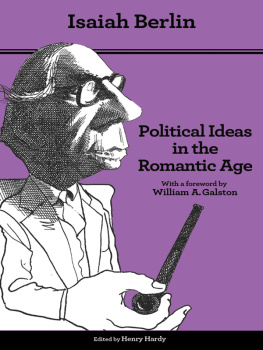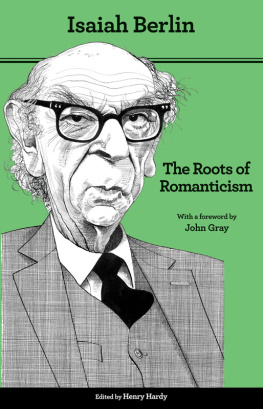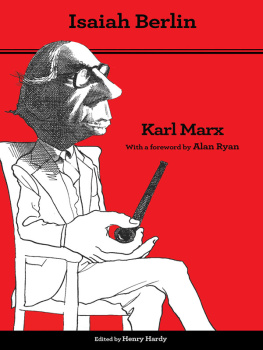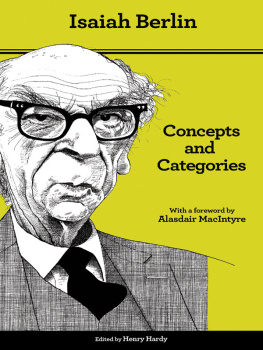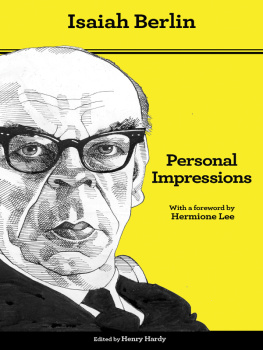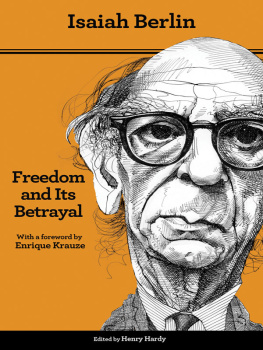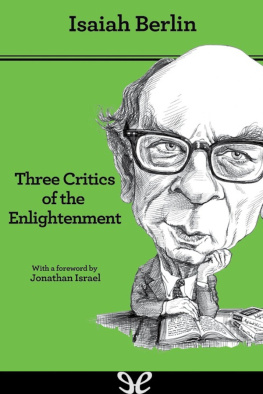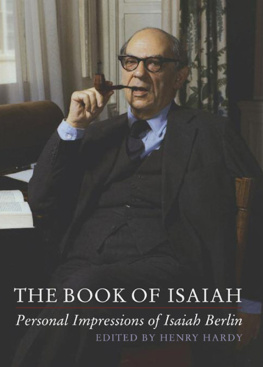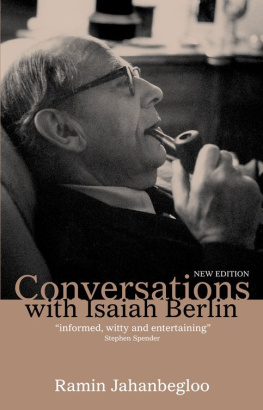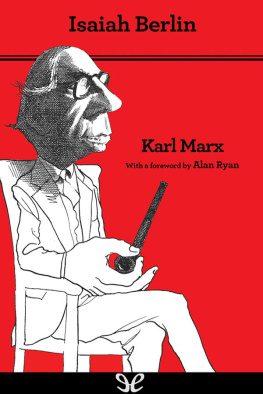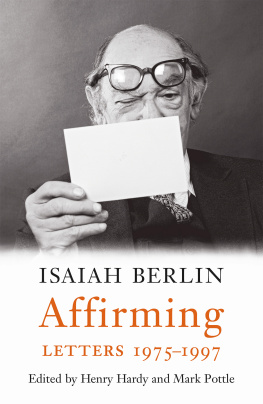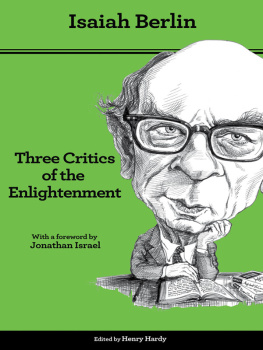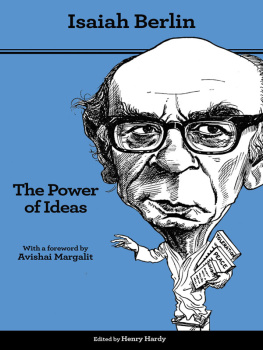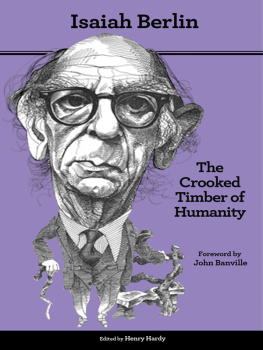
POLITICAL IDEAS IN THE ROMANTIC AGE
ISAIAH BERLIN WAS BORN IN RIGA, now capital of Latvia, in 1909. When he was six, his family moved to Russia; there in 1917, in Petrograd, he witnessed both Revolutions Social Democratic and Bolshevik. In 1921 he and his parents came to England, and he was educated at St Pauls School, London, and Corpus Christi College, Oxford.
At Oxford he was a Fellow of All Souls, a Fellow of New College, Professor of Social and Political Theory, and founding President of Wolfson College. He also held the Presidency of the British Academy. In addition to Political Ideas in the Romantic Age, his main published works are Karl Marx, Russian Thinkers, Concepts and Categories, Against the Current, Personal Impressions, The Crooked Timber of Humanity, The Sense of Reality, The Proper Study of Mankind, The Roots of Romanticism, The Power of Ideas, Three Critics of the Enlightenment, Freedom and Its Betrayal, Liberty and The Soviet Mind. As an exponent of the history of ideas he was awarded the Erasmus, Lippincott and Agnelli Prizes; he also received the Jerusalem Prize for his lifelong defence of civil liberties. He died in 1997.
Henry Hardy, a Fellow of Wolfson College, Oxford, is one of Isaiah Berlins Literary Trustees. He has edited (or co-edited) many other books by Berlin, including the first three of four volumes of his letters, and is currently working on the remaining volume with Mark Pottle.
Joshua L. Cherniss is a graduate of Yale, holds a doctorate in history from Oxford, and is completing a Ph.D. in political theory at Harvard. He has taught political theory at Yale, Harvard and Smith College, and is the author of A Mind and Its Time: The Development of Isaiah Berlins Political Thought (2013).
William A. Galston is a Senior Fellow and Ezra Zilkha Chair in Governance Studies at the Brookings Institution. His many books on political theory include Liberal Pluralism (2002) and The Practice of Liberal Pluralism (2005).
For further information about Isaiah Berlin visit
ALSO BY ISAIAH BERLIN
*
Karl Marx
The Hedgehog and the Fox
The Age of Enlightenment
Russian Thinkers
Concepts and Categories
Against the Current
Personal Impressions
The Crooked Timber of Humanity
The Sense of Reality
The Proper Study of Mankind
The Roots of Romanticism
The Power of Ideas
Three Critics of the Enlightenment
Freedom and Its Betrayal
Liberty
The Soviet Mind
with Beata Polanowska-Sygulska
Unfinished Dialogue
*
Flourishing: Letters 19281946
Enlightening: Letters 19461960
Building: Letters 19601975
POLITICAL IDEAS IN THE ROMANTIC AGE
THEIR RISE AND INFLUENCE ON MODERN THOUGHT

ISAIAH BERLIN
Edited by Henry Hardy
Introduction by Joshua L. Cherniss
Second Edition
Foreword by William A. Galston
PRINCETON UNIVERSITY PRESS
PRINCETON AND OXFORD
Published in the United States of America, its Colonies and Dependencies, the Philippine Islands and Canada by Princeton University Press, 41 William Street, Princeton, New Jersey 08540
Requests for permission to reproduce material from this work should be sent to Permissions, Princeton University Press
press.princeton.edu
First published by Chatto & Windus and Princeton University Press
2006
Second edition published by Princeton University Press 2014
The Isaiah Berlin Literary Trust and Henry Hardy 2006, 2014
Editorial matter Henry Hardy 2006, 2014
Introduction Joshua L. Cherniss 2006
Foreword Princeton University Press 2014
The moral right of Isaiah Berlin and Henry Hardy to be identified as the author and editor respectively of this work has been asserted
All Rights Reserved
ISBN 978-0-691-15844-0
British Library Cataloging-in-Publication Data is available
This book has been composed in Garamond Premier Pro
Printed on acid-free paper 
Printed in the United States of America
1 3 5 7 9 10 8 6 4 2
In memory of Solomon Rachmilevich
Born in Riga, 16 August 1891
Naturalised as a British citizen, 5 April 1937
Died in London, 30 November 1953, aged 62
CONTENTS
by William A. Galston |
by Joshua L. Cherniss |
POLITICAL IDEAS IN THE ROMANTIC AGE |
FOREWORD
Ambivalent Fascination
ISAIAH BERLIN AND POLITICAL ROMANTICISM
William A. Galston
A CENTURY AGO, Benedetto Croce published his famous commentary, What Is Living and What Is Dead in the Philosophy of Hegel. Now, more than six decades after the lectures than became Political Ideas in the Romantic Age (PIRA), it is possible indeed necessary to pose a similar question about Berlin.
At the beginning of PIRA, Berlin states that the social and political ideas of leading thinkers of the late eighteenth and early nineteenth century are of more than historical interest: they form the basic intellectual capital on which, with few additions, we live to this day.
Not everyone agreed with Berlins assessment. By the early 1950s, some social scientists were propounding versions of what became known as the end of ideology. Despite the continuing presence of Communist parties throughout Western Europe and Fascist-tinged regimes on the Iberian peninsula, many believed that the Second World War and its aftermath had largely settled the great ideological struggles of the interwar period and that the amalgam of democratic institutions, civic and social liberties, and the Welfare State represented the Wests all-but-certain future.
Whatever may have been the case in 1952, it is much harder today to make the case for the continuing ideological relevance of the thinkers Berlin explores in PIRA. To be sure, we have not reached global consensus on liberal democracy an expectation that became fashionable after the collapse of the Soviet bloc. Still, refuted by their consequences, Communism and Fascism have lost not only their grip on the unfortunate nations they once dominated, but also most of their appeal for intellectuals who gravitated to them as alternatives to what they regarded as the shallowness and injustice of bourgeois society. While technocracy is not quite extinct, faith in central planning has surely attenuated. Few now endorse history as the story of progress. Some political theorists still labour to make sense of the General Will, but hardly anyone else cares. Hegels influence on the culture and politics of the West has waned; Nietzsche, the nineteenth-century thinker with the greatest continuing influence, makes only a cameo appearance in PIRA.
As for the people: they may be as shallow and fickle as the nineteenth-century thinkers opposed to liberty and democracy supposed, but the alternatives heroic leaders and vanguard parties such as Russias Bolsheviks proved far worse. The spread of egalitarianism has thrown elitist theories of politics on the defensive. In an ironic victory for the last men, even Nietzsche has been democratised. The few remaining vanguard parties, such as the Chinese and North Korean Communists, rest their case for coercion on political necessity national unity, social tranquillity rather than positive freedom directed by all-knowing authority.
Next page
